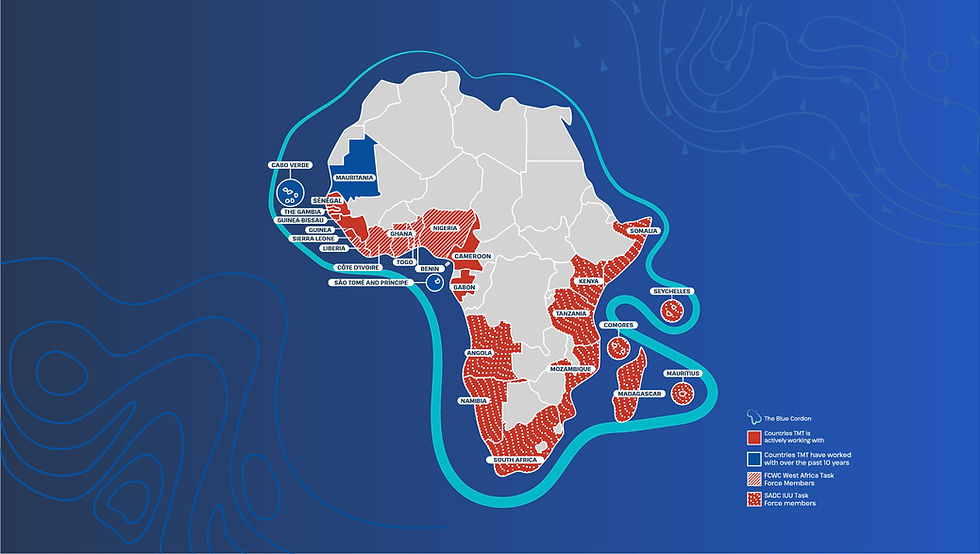Equipping FCWC Member States for Success in Combating IUU Fishing
- Trygg Mat Tracking TMT
- Jun 5, 2021
- 3 min read
Published on June 5 - International Day for the Fight against Illegal, Unreported and Unregulated Fishing 2021

Effective regional cooperation, national inter-agency collaboration, regular exchange of information and strong regional monitoring, control and surveillance (MCS) are all essential in combating illegal fishing and associated crime.
Towards just this purpose, the West Africa Task Force (WATF) brings together the six member countries of the Fisheries Committee for the West Central Gulf of Guinea (FCWC) – Benin, Côte d’Ivoire, Ghana, Liberia, Nigeria and Togo – in a united effort to target illegal fishing operations in their sub-region. The Task Force is facilitated by the FCWC Secretariat and assisted by a Technical Team that includes TMT and Stop Illegal Fishing (SIF), and supported by Norad[1] and the EU-PESCAO project.
Over the past year and more, the global Covid-19 pandemic has required the FCWC West Africa Task Force Member States to adapt their national MCS regimes, and their ways of working regionally together. This has seen in a rapid adaptation to a more digital world, one in which face to face meetings and personnel exchanges have moved more online, the use of satellite monitoring tools has been regionally established through the establishment of a FCWC Regional MCS Centre (RMCSC), and the use of equipment such as body cameras and drones to assist port controls are being considered and trialled.
At the centre of these efforts is ensuring that effective communications are maintained, and that MCS personnel can continue to do their crucial jobs in fisheries monitoring centres, at dockside, and at sea.
Towards this end key equipment is now being provided to each of the FCWC Member States to support their national and regional MCS efforts.
With the establishment of the RMCSC, dedicated equipment for national fisheries monitoring centres is being provided for national access to the regional vessel monitoring system (VMS) and automatic identification system (AIS), key vessel tracking tools. For many of the States, this is the first time that they will have access to this technology and capabilities to monitor fishing vessels in their waters.
To support communications and capacity building efforts, communication rooms with virtual facilities are being established in the Fisheries Agency of each FCWC Member State. Equipped with key conferencing and training facilities, the communications rooms will support the ability for the Member States to regularly interact between themselves, the FCWC Secretariat and the WATF technical team - for example through monthly Heads of MCS meetings. Virtual training programmes are being established to run through these facilities. Crucially, the communication rooms will also support broader communication efforts and needs, for example for communicating with international partners, and participation in international forums.
Recognising also that ‘pointy end’, get-your-hands-dirty MCS is still absolutely crucial, particularly as many of the FCWC Member States begin implementation of the Port States Measures Agreement (PSMA), operational, safety and data collection equipment is also being made available, much of which is extremely difficult to procure in the region, and due to conditions wears out quickly. Ensuring that MCS officers are safe and have the tools they need to carry out key MCS operations such as a vessel inspection in port significantly enhances the effectiveness of those efforts, and the deterrent effect they have on illegal fishing activities.
For all equipment, an associated training programme is provided to ensure establishment, safety, uptake and use.
The process of the distribution began in March as travel in the sub-region began to open up and will continue in the coming weeks. In Togo and Benin, hand over ceremonies from the FCWC to national Ministers were also participated by Members of Cabinet, Prefet Maritime, FAO, EU delegations, national technical staff and TMT. A second round of distribution of equipment is planned in June with a visit to Cote d’Ivoire and Liberia.
Small, but significant steps as the FCWC Member States take ever further steps to stamp out illegal fishing in their region!
[1] The Norad funded project ‘Fisheries Intelligence and MCS Support in West Africa’ is being implemented in support of the West Africa Task Force by TMT, the FCWC Secretariat, and Stop Illegal Fishing.
















































